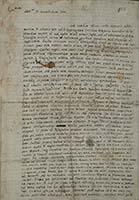Identity area
Reference code
Add. MS a/608
Title
Letter from Isaac Barrow to the Fellows of Trinity College, Cambridge
Date(s)
- 1 Aug. 1658 (Creation)
Level of description
Item
Extent and medium
1 folded sheet
Context area
Name of creator
Repository
Archival history
Part of the Enys Collection of Autograph Manuscripts, sold at Bonhams 28 Sept. 2004.
Immediate source of acquisition or transfer
Purchased from Bonhams, 2004.
Content and structure area
Scope and content
Pera, Constant[ino]politanae - After an apology for the long delay in writing to the Fellowship, Barrow gives an account of his travels from Paris, with a description of his stay in Florence, prolonged because of the plague in Naples, which was predicted… read more
Conditions of access and use area
Language of material
- Latin
Allied materials area
Publication note
William Derham, Philosophical Letters. London: Printed by William and John Innys, 1718.

